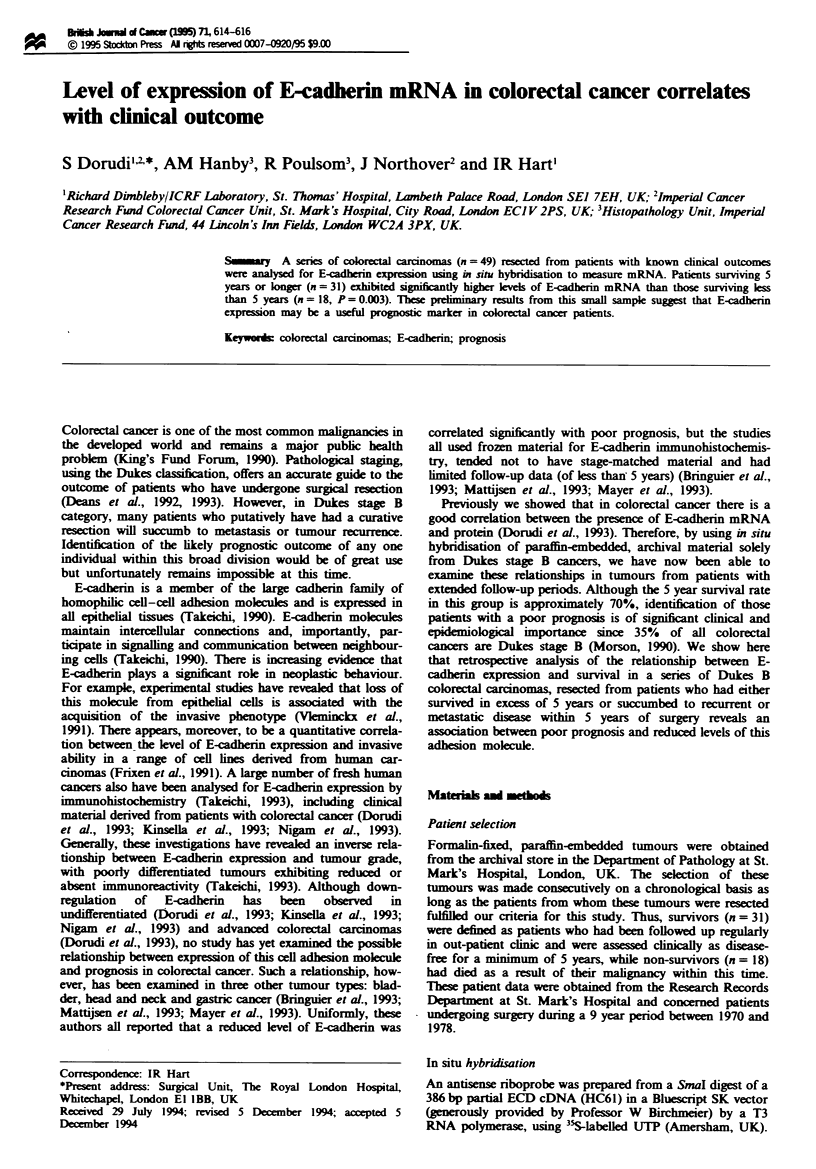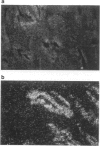Abstract
A series of colorectal carcinomas (n = 49) resected from patients with known clinical outcomes were analysed for E-cadherin expression using in situ hybridisation to measure mRNA. Patients surviving 5 years or longer (n = 31) exhibited significantly higher levels of E-cadherin mRNA than those surviving less than 5 years (n = 18, P = 0.003). These preliminary results from this small sample suggest that E-cadherin expression may be a useful prognostic marker in colorectal cancer patients.
Full text
PDF


Images in this article
Selected References
These references are in PubMed. This may not be the complete list of references from this article.
- Bringuier P. P., Umbas R., Schaafsma H. E., Karthaus H. F., Debruyne F. M., Schalken J. A. Decreased E-cadherin immunoreactivity correlates with poor survival in patients with bladder tumors. Cancer Res. 1993 Jul 15;53(14):3241–3245. [PubMed] [Google Scholar]
- Deans G. T., Parks T. G., Rowlands B. J., Spence R. A. Prognostic factors in colorectal cancer. Br J Surg. 1992 Jul;79(7):608–613. doi: 10.1002/bjs.1800790706. [DOI] [PubMed] [Google Scholar]
- Deans G. T., Patterson C. C., Parks T. G., Spence R. A., Heatley M., Moorehead R. J., Rowlands B. J. Colorectal carcinoma: importance of clinical and pathological factors in survival. Ann R Coll Surg Engl. 1994 Jan;76(1):59–64. [PMC free article] [PubMed] [Google Scholar]
- Dorudi S., Sheffield J. P., Poulsom R., Northover J. M., Hart I. R. E-cadherin expression in colorectal cancer. An immunocytochemical and in situ hybridization study. Am J Pathol. 1993 Apr;142(4):981–986. [PMC free article] [PubMed] [Google Scholar]
- Frixen U. H., Behrens J., Sachs M., Eberle G., Voss B., Warda A., Löchner D., Birchmeier W. E-cadherin-mediated cell-cell adhesion prevents invasiveness of human carcinoma cells. J Cell Biol. 1991 Apr;113(1):173–185. doi: 10.1083/jcb.113.1.173. [DOI] [PMC free article] [PubMed] [Google Scholar]
- Kinsella A. R., Green B., Lepts G. C., Hill C. L., Bowie G., Taylor B. A. The role of the cell-cell adhesion molecule E-cadherin in large bowel tumour cell invasion and metastasis. Br J Cancer. 1993 May;67(5):904–909. doi: 10.1038/bjc.1993.169. [DOI] [PMC free article] [PubMed] [Google Scholar]
- Mattijssen V., Peters H. M., Schalkwijk L., Manni J. J., van 't Hof-Grootenboer B., de Mulder P. H., Ruiter D. J. E-cadherin expression in head and neck squamous-cell carcinoma is associated with clinical outcome. Int J Cancer. 1993 Oct 21;55(4):580–585. doi: 10.1002/ijc.2910550411. [DOI] [PubMed] [Google Scholar]
- Mayer B., Johnson J. P., Leitl F., Jauch K. W., Heiss M. M., Schildberg F. W., Birchmeier W., Funke I. E-cadherin expression in primary and metastatic gastric cancer: down-regulation correlates with cellular dedifferentiation and glandular disintegration. Cancer Res. 1993 Apr 1;53(7):1690–1695. [PubMed] [Google Scholar]
- Moll R., Mitze M., Frixen U. H., Birchmeier W. Differential loss of E-cadherin expression in infiltrating ductal and lobular breast carcinomas. Am J Pathol. 1993 Dec;143(6):1731–1742. [PMC free article] [PubMed] [Google Scholar]
- Nigam A. K., Savage F. J., Boulos P. B., Stamp G. W., Liu D., Pignatelli M. Loss of cell-cell and cell-matrix adhesion molecules in colorectal cancer. Br J Cancer. 1993 Sep;68(3):507–514. doi: 10.1038/bjc.1993.377. [DOI] [PMC free article] [PubMed] [Google Scholar]
- Ponte P., Gunning P., Blau H., Kedes L. Human actin genes are single copy for alpha-skeletal and alpha-cardiac actin but multicopy for beta- and gamma-cytoskeletal genes: 3' untranslated regions are isotype specific but are conserved in evolution. Mol Cell Biol. 1983 Oct;3(10):1783–1791. doi: 10.1128/mcb.3.10.1783. [DOI] [PMC free article] [PubMed] [Google Scholar]
- Rasbridge S. A., Gillett C. E., Sampson S. A., Walsh F. S., Millis R. R. Epithelial (E-) and placental (P-) cadherin cell adhesion molecule expression in breast carcinoma. J Pathol. 1993 Feb;169(2):245–250. doi: 10.1002/path.1711690211. [DOI] [PubMed] [Google Scholar]
- Schipper J. H., Frixen U. H., Behrens J., Unger A., Jahnke K., Birchmeier W. E-cadherin expression in squamous cell carcinomas of head and neck: inverse correlation with tumor dedifferentiation and lymph node metastasis. Cancer Res. 1991 Dec 1;51(23 Pt 1):6328–6337. [PubMed] [Google Scholar]
- Senior P. V., Critchley D. R., Beck F., Walker R. A., Varley J. M. The localization of laminin mRNA and protein in the postimplantation embryo and placenta of the mouse: an in situ hybridization and immunocytochemical study. Development. 1988 Nov;104(3):431–446. doi: 10.1242/dev.104.3.431. [DOI] [PubMed] [Google Scholar]
- Takeichi M. Cadherins in cancer: implications for invasion and metastasis. Curr Opin Cell Biol. 1993 Oct;5(5):806–811. doi: 10.1016/0955-0674(93)90029-p. [DOI] [PubMed] [Google Scholar]
- Takeichi M. Cadherins: a molecular family important in selective cell-cell adhesion. Annu Rev Biochem. 1990;59:237–252. doi: 10.1146/annurev.bi.59.070190.001321. [DOI] [PubMed] [Google Scholar]
- Vleminckx K., Vakaet L., Jr, Mareel M., Fiers W., van Roy F. Genetic manipulation of E-cadherin expression by epithelial tumor cells reveals an invasion suppressor role. Cell. 1991 Jul 12;66(1):107–119. doi: 10.1016/0092-8674(91)90143-m. [DOI] [PubMed] [Google Scholar]



